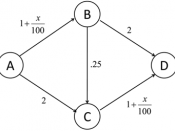How can game theory help us to understand firms' interactions? Explain using the different models of quantity and price competition.
Game theory is best described as pure rational interactive decision making. In recent decades much progress has been made in applying game theoretic models to a wide range of economic problems. Game theory is divided into two branches, cooperative and non-cooperative. In non-cooperative game theory, individuals cannot make agreements so the main focus is the individual who is concerned with doing as well as possible for himself, subject to pre-defined rules and possibilities. In cooperative game theory, agreements are allowed and the main focus will be the group or coalition.
As this essay is about understanding firms' interactions using different models of quantity and price competition, I will only pay attention to non-cooperative game theory. Furthermore, I am going to avoid a lot of the mathematical equations and detailed analysis of the fundamentals of the theory.
I will try to outline the most important concepts in simple terms and see how game theory applies to specific economic interactions.
Formulation of the Game Von Neumann and Morgenstern (1964) first recognised explicitly that economic agents must take into account the interactive nature of situations when making their decisions. The method they used consisted of taking an economic problem, formulating it as a game, finding the game theoretic solution, and translating the solution back into economic terms .
So how do we formulate an economic problem as a game? The essential elements of a game are players, actions, information, strategies, payoffs and equilibria. The sets of players, strategies and payoffs combine to give us the rules of the game. There are two models, the strategic and extensive forms. Two main equilibrium concepts used are dominant strategy equilibrium and Nash equilibrium. A dominant strategy...


